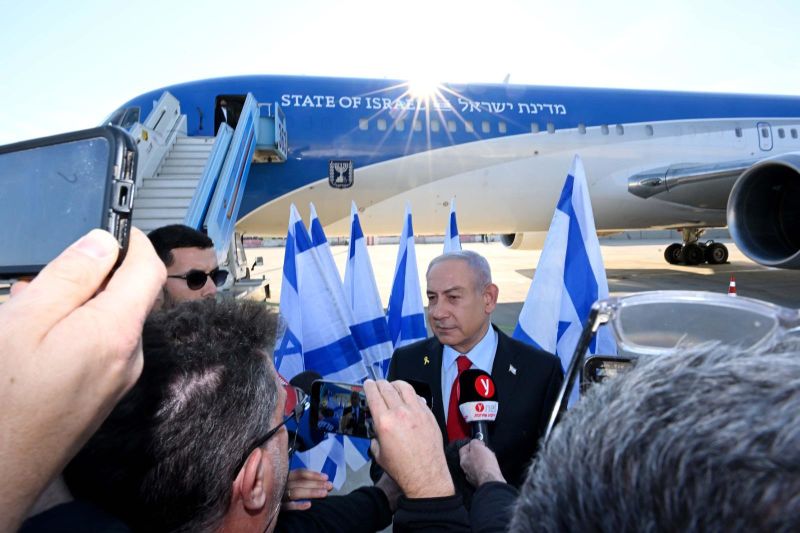
Netanyahu blows past ceasefire talks deadline to confer with Trump
A deadline to begin talks on extending Gaza’s ceasefire arrived Monday with the Israeli prime minister in Washington, silence from his office about when a negotiating team might engage with Hamas, and considerable uncertainty about what the next stage of the fragile truce will look like.
The ceasefire, in place for just over two weeks, is set to expire on March 1. Under the terms of the deal, talks on the next phase are supposed to begin no later than Monday.
But the Israeli government has yet to publicly unveil a negotiating team for the talks, let alone send them to Qatar or Egypt, where Hamas is sending a delegation this week. Hamas has not publicly commented on Monday’s deadline.
Qatar’s prime minister, who has acted as an intermediary in the talks, said Sunday that there were “no clear details” on when or how the talks would start. “We hope to see some movement in the coming days,” Mohammed bin Abdulrahman Al-Thani said during a press conference in Doha.
Israeli Prime Minister Benjamin Netanyahu has made clear that he sees the path forward not in Doha or Cairo, but in Washington, where he will this week become the first foreign leader to hold a formal meeting with US President Donald Trump.
Netanyahu’s office said on the eve of his departure that he had agreed with Trump’s Middle East envoy that “negotiations on the second phase of the hostage deal will begin with their meeting in Washington,” during which “they will discuss Israel’s positions.”
Since the ceasefire went into effect on January 19, Hamas and its allies have released 18 hostages held in Gaza. In exchange, the Israeli government has released 583 Palestinians held in detention – some serving life sentences for serious offenses – but also a significant number of children held without public charge or trial.
The ceasefire has seen the withdrawal of Israeli forces from Gazan population centers, a surge of aid entering the enclave and, for the first time since May last year, the opening of the vital Rafah crossing on the border with Egypt for the evacuation of injured and sick Palestinians.
It has also largely held apart from a few violations – only the second respite in 15 months of war, after a brief truce in November 2023.
Chief among Netanyahu’s concerns this week will be what Trump wants. The American president was not yet in office during the first round of ceasefire talks, though his team played a large role in pushing Israel toward a deal.
“Our decisions and the courage of our soldiers have redrawn the map,” Netanyahu said on the tarmac of Ben Gurion Airport Sunday. “But I believe that, working closely with President Trump, we can redraw it even further and for the better.”
But Gershon Baskin, a veteran Israeli negotiator and peace activist, said in a statement that Netanyahu’s “refusal to begin negotiations on the day stipulated in the agreement is a clear violation of the agreement.”
“Israel demands that Hamas adhere to all the terms of the agreement, while simultaneously violating it in a significant way. Once again, Netanyahu is abandoning the hostages and endangering them.”
Trump claimed credit for the current ceasefire and pledged upon taking office to end foreign wars. But he has also now repeated his desire for the 2 million people of Gaza to leave so that “we just clean out that whole thing.” The forced displacement of civilians can constitute “a war crime and/or crime against humanity,” according to the United Nations.
Trump’s proposal was music to the ears of the most extreme minister in Netanyahu’s governing coalition. Finance minister Bezalel Smotrich, who vehemently opposed the withdrawal of Israeli forces and settlers from Gaza in 2005, wants Jews to resettle in the enclave.
“Encouraging migration (of Palestinians out of Gaza) is the only solution that will bring peace and security to the residents of Israel and alleviate the suffering of Gaza’s Arab residents,” he said after Trump expressed his desire for Palestinians to leave.
Already one minister – the far-right Itamar Ben-Gvir – has withdrawn his party from the Israeli government over the ceasefire, calling it a capitulation. Smotrich has pledged he will do the same if Israel does not renew the war in Gaza when the current, first phase of the ceasefire expires.
Kareem Khadder, Mike Schwartz and Eyad Kourdi contributed to this report.
